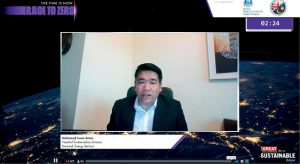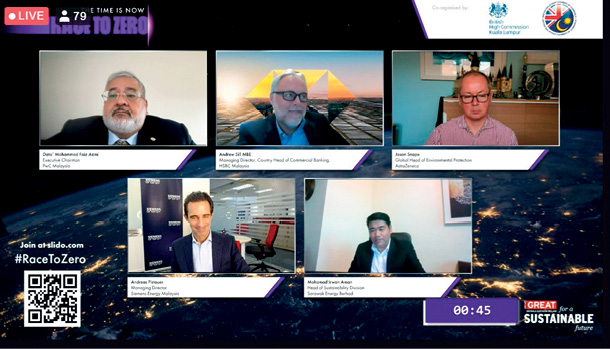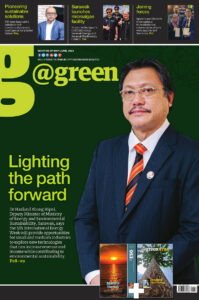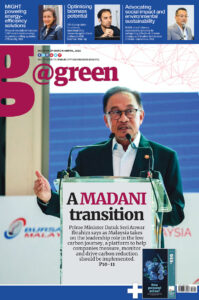Sarawak Energy shares sustainability initiatives
Sarawak Energy had the opportunity to share with multinational industry leaders their vision of securing a sustainable energy future for Sarawak and its ongoing efforts to achieve this by exploring renewable energy solutions during Malaysia ‘Race to Zero’ campaign webinar.
On the webinar’s panel session titled “Why Combating Climate Change is a Business Priority for Us”, Mohamad Irwan Aman, Head of Sustainability Division for Sarawak Energy said that Sarawak Energy acknowledged and understood how crucial it was to set a business ambition that would contribute to the global and national sustainability agenda.

“We are a growing utility and energy provider, and sustainability underpins the way Sarawak Energy operates. This requires us to understand climate change risks and opportunities to maintain business resilience,” said Irwan.
“As we progress our ambition to achieve full electrification in Sarawak by 2025 from our current 98 per cent domestic coverage, we are aligned with the United Nations Sustainable Development Goals, with much focus on six main goals especially Goal 7 on Affordable and Clean Energy and Goal 13 on Climate Action.”
Irwan was among fellow panellists Stuart Milne (Chief Executive Officer for HSBC Bank Malaysia), Jason Snape (Global Head of Environmental Protection for AstraZeneca) and Andreas Pistauer (Managing Director for Siemens Energy Malaysia).
Datuk Mohammad Faiz Azmi, Executive Chairman for PwC Malaysia, moderated the session.
Race to Zero is a global campaign to rally leadership and support from businesses, cities, regions, and investors to achieve a net-zero economy by 2050.
The webinar, jointly held by the British Malaysian Chamber of Commerce (BMCC) and the British High Commission Kuala Lumpur recently, highlighted the benefits of shifting to a zero-carbon future 2021 before the United Nations Climate Change Conference (COP26) in the United Kingdom and Italy this November.
Irwan mentioned that Sarawak Energy was also actively pursuing opportunities to adopt low-carbon solutions and the promotion of a low-carbon economy.
In 2019, Sarawak Energy built and commissioned Southeast Asia’s first integrated hydrogen production plant and refuelling station in Kuching with Linde, the world’s largest industrial gas company.
Given its abundant hydropower resources, Sarawak provides an ideal setting in enabling the hydrogen economy. Hence, a study was initiated as pioneering steps to explore the commercial and public application of hydrogen and fuel cell technology.
“Sarawak Energy now produces green hydrogen through electrolysis at the facility, contributing to the development of technologies that will alter the energy utilisation landscape and progress a green hydrogen economy for Sarawak,” said Irwan.
He added that Sarawak Energy was also embarking on a large-scale floating solar on one of its hydropower reservoirs. This showed how active the company was in exploring alternative renewables.
It would continue to invest in digitalisation, energy-efficient generation and climate-friendly technologies to further reduce carbon emissions from its power system.
A milestone in its sustainability commitment, Sarawak Energy was the first company in Malaysia to sign the pledge for “Business Ambition for 1.5°Celsius” under the United Nations Global Compact in July 2020.
By signing the pledge, Sarawak Energy committed to setting a science-based emission reduction target across relevant scopes. It would be in line with the Paris Agreement to pursue efforts to limit the global temperature increase to 1.5°C above pre-industrial levels by 2030.
Since then, Sarawak Energy has developed a high-level strategy on Climate Action that would help the company mitigate and adapt to climate change impacts.
Together with the science-based targets initiative (SBTi) under the “Business Ambition for 1.5°Celsius” pledge, Sarawak Energy embarked on voluntary climate-related financial disclosures guided by the Task Force on Climate-Related Financial Disclosures (TCFD) for better access to data in managing climate-related risks.
This will increase the effectiveness in measuring and evaluating climate-related risks about Sarawak Energy and its supply chain.
“Our business model supports this ambition. Our focus on renewable hydropower making up the primary component of Sarawak Energy’s generation mix has already seen the carbon emission intensity of Sarawak’s primary grid decrease by 68 per cent during 2011-2019.
“Sarawak Energy is celebrating its 100 years of powering Sarawak this year. We look forward to another 100 years of responsibly providing renewable energy solutions for Sarawak and beyond,” he concluded. — @green








